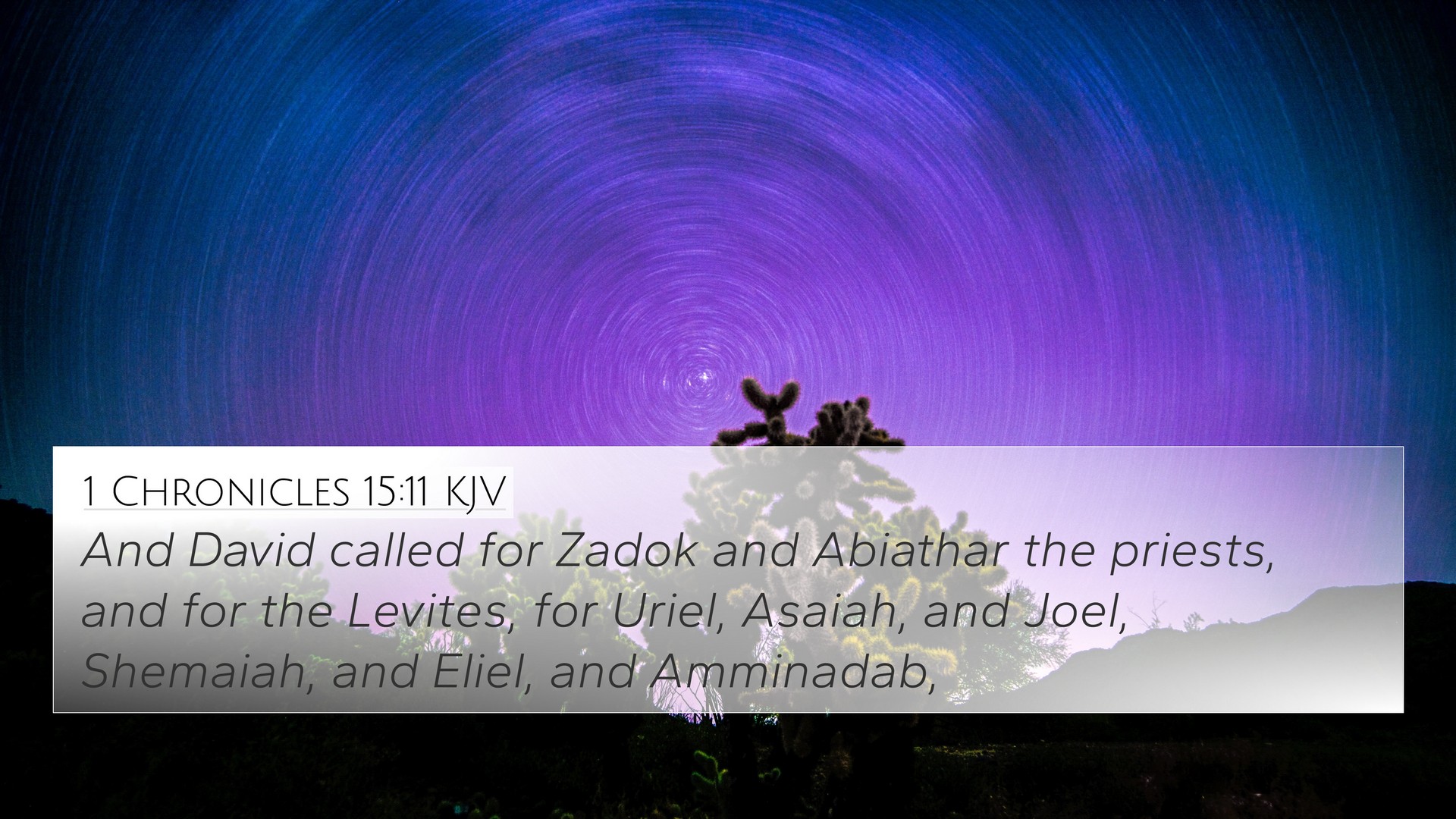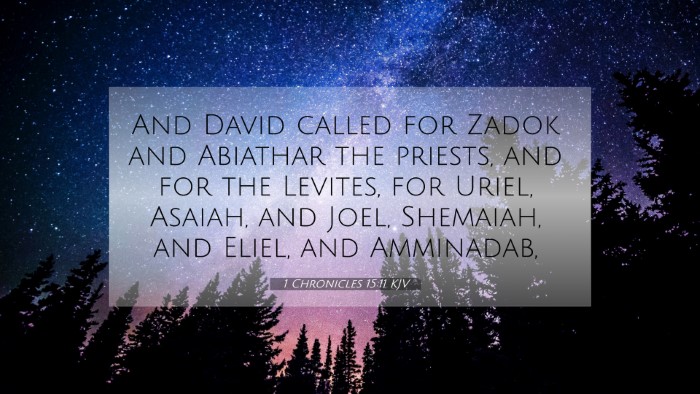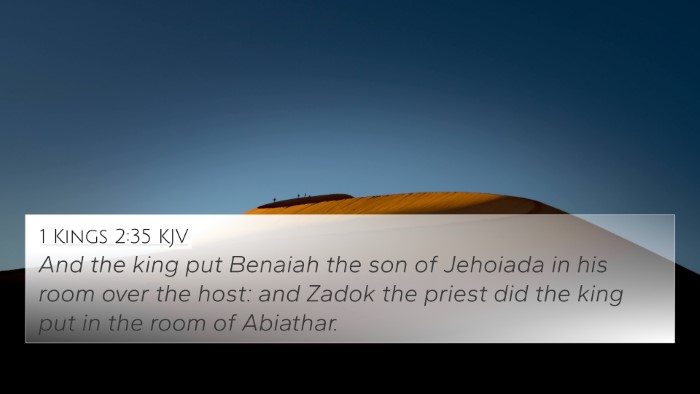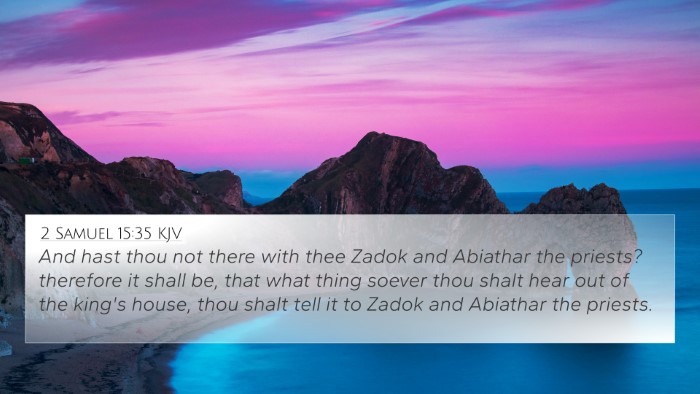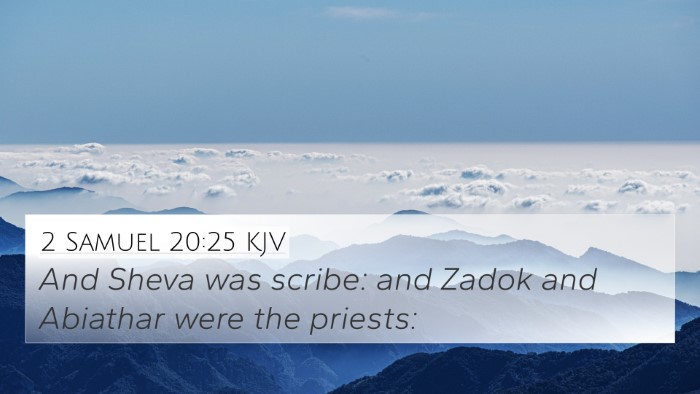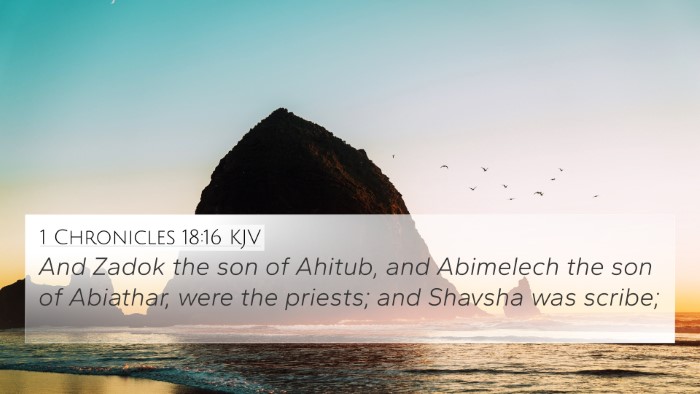Understanding 1 Chronicles 15:11
This verse is pivotal in the context of King David’s efforts to bring the Ark of the Covenant to Jerusalem, highlighting not only the importance of the Ark but also the necessity of proper spiritual leadership and obedience to God's commandments.
Verse Context
1 Chronicles 15:11: "And David called for Zadok and Abiathar the priests, and for the Levites, for Uriel, Asahiah, and Joel, and Shemaiah, and Eliezaphan, and Abijah."
This verse occurs during a significant moment in the narrative, reflecting David's commitment to honor God in the process of relocating the Ark and signifies the gathering of spiritual leaders in Israel to prepare for the sacred task.
Commentary Insights
-
Matthew Henry:
Matthew Henry emphasizes the importance of David’s choice of spiritual leaders, suggesting that he wisely consults those who are obedient to God. This illustrates the necessity of having righteous and godly individuals in important spiritual roles, especially when undertaking a task that has religious significance.
-
Albert Barnes:
Barnes points out that David specifically called upon the priests and Levites, indicating a clear understanding of the roles that these leaders play in mediating between God and the people. This act signifies a restoration of proper worship and reverence in the communities of Israel.
-
Adam Clarke:
Clarke notes that by summoning these specific leaders, David is also acknowledging the importance of unity and cooperation among the tribes of Israel. Each of these leaders had distinct responsibilities and skills that were crucial for the success of the forthcoming process of bringing the Ark safely to Jerusalem.
Related Themes
The themes of leadership, obedience, and communal worship emerge strongly from this verse. It emphasizes how collective involvement under godly leadership fosters a sense of unity in worship and underscores the idea that God's presence is paramount in the lives of His people.
Bible Verse Cross-References
- 2 Samuel 6:1-15: The account of David bringing the Ark of the Covenant to Jerusalem.
- 1 Chronicles 13:1-14: David's earlier attempt to retrieve the Ark and the disobedience that led to tragedy.
- Numbers 4:15: Instructions on how the Ark should be handled and the importance of holiness.
- Psalms 132:8: A plea inviting God to arise and take residence among the people.
- Hebrews 9:4: The significance of the Ark of the Covenant in the New Testament context.
- 1 Corinthians 14:40: The importance of order and decency in worship and community gatherings.
- Malachi 2:7: The role of priests and teachers in conveying God’s law to the people.
Connecting Verses and Thematic Connections
In exploring connections between Bible verses regarding leadership and worship, this verse highlights how God’s established order is essential for fulfilling the spiritual mandates of His people. The collaboration of leaders like Zadok and Abiathar reflects a broader theme found throughout scripture.
Key Insights for Cross-Referencing
Utilizing tools for Bible cross-referencing can enhance the study of such themes. By employing a Bible concordance or a cross-reference guide, readers can trace connections between Old and New Testament teachings, leading to a deeper understanding of how to interpret Biblical themes.
Final Thoughts on 1 Chronicles 15:11
The gathering of leaders as described in this verse speaks to the necessity of spiritual integrity and obedience in worship. It sets a precedent of how worship should be conducted with awareness of God’s holiness and the roles designated within the community.
Applying the Insights
Understanding scripture through the lens of inter-Biblical dialogue enriches one’s faith journey. Connections found through comparative Bible verse analysis not only illuminate individual verses but also explore the overarching narrative of scripture which emphasizes God’s desire for relationship with His people.
Whether seeking to dive deeper into the cross-referenced themes or preparing for sermon discussions, grasping the significance of 1 Chronicles 15:11 assists believers in recognizing the critical framework for worship grounded in godly leadership and community involvement.
